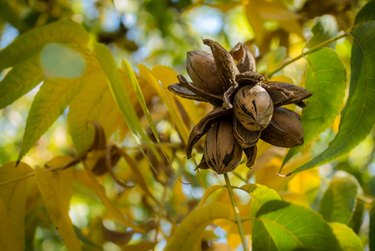
Here's yet another item to add to the list of things easier said than done: spraying pecan trees (Carya illinoinensis). Yes, you can prevent a host of pecan tree issues by spraying the trees, and you can cure some disease and pest problems. But given the height of these trees and the breadth of the canopy, it isn't really a very practical step to consider for mature trees. If you have a young tree you want to protect, this information might help you.
Pecan Trees Are Huge
Video of the Day
If you are thinking of putting in a pecan tree, you'll have to wait up to a decade to eat your first pecan pie made with harvested nuts. But that's not excessive when you realize that these magnificent trees can live for three centuries or more.
Video of the Day
You could use many different words to describe a pecan tree. Noble, stately and tall come to mind. But huge works too. Pecan trees can grow to 100 feet tall, the height of a 10-story building. And the canopy can expand to 75 feet wide. This means the tree is simply too big for your average home garden to begin with. And very, very tricky to spray.
Pecan Fungal Disease #1: Scab
Pecan trees generally thrive in U.S. Department of Agriculture plant hardiness zones 6 through 9, where they are quite healthy, producing both gorgeous wood and delicious nuts. But if your region has hot, humid summers, your tree may be attacked by one or more fungal diseases that it would avoid in drier areas. These diseases don't do in the mighty trees, but they can reduce both their vigor and their nut crop.
Scab is the most prevalent and challenging disease to attack pecan trees. It attacks the pecan leaves, but mature leaves are safe. Scab only does damage to young leaves, from bud break until they reach maturity. Pecan scab, caused by the fungus Cladosporium caryigenum, forms spots or on leaves and nut shucks, expanding as the leaves expand. The greatest damage happens if scab infects the nuts, which can reduce the yield and quality of the harvest.
Scab is worse when there is a lot of rainfall and increased hot, humid conditions. In dry weather with minimal rainfall, the disease is much less severe. The excessive use of nitrogen fertilizer for pecans can also encourage scab.
Spraying for Scab
A preventive fungicide spray program is very effective to prevent scab on pecans. But it is only effective if you begin fungicide applications when leaf buds are opening. You have to follow up with a continuation of sprays, rotating three different fungicides. On average, you must spray about 12 times every growing season. And the spray must be thorough, covering all of the foliage on the entire tree canopy. For homeowners, a preventative fungicide spray program is not a very feasible means of controlling scab.
Given the size of the mature trees and the need for thorough, canopy-covering sprays, you probably can't do this yourself. Traditional spray equipment (hose-end sprayers) only reach up 30 feet at most. That means you may have to hire a professional to do this spraying.
What to use? Try a fungicide with the active ingredient "propiconazole." It may be expensive to pay someone to do this, but the spray will also remedy powdery mildew, downy spot, brown spot, Gnomonia leaf spot and liver spot.
Other Sprays
Your pecan tree may also require spraying for zinc deficiencies, said to be common in backyard-grown pecan trees. Symptoms of zinc deficiency include shoot tips with branched twigs and too-small leaves. Zinc sulfate sprays are an effective cure for this deficiency. Apply at bud break and twice more before the middle of June.
Pecan pests can also require spraying. Pecan trees may attract various species of phylloxera, tiny, aphidlike pests that can destroy your crop. The trees are also attacked by mites, aphids, pecan nut casebearer and most other pecan pests. All of these pests can be managed by spraying with carbaryl at bud break, repeated several more times during the season.